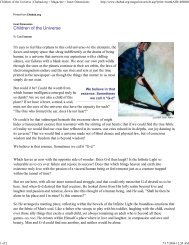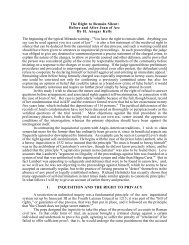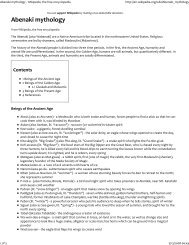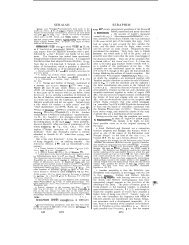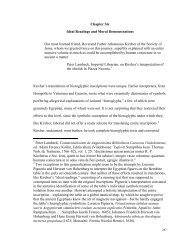Encylodaedia Biblica; a critical dictionary of the literary, political and ...
Encylodaedia Biblica; a critical dictionary of the literary, political and ...
Encylodaedia Biblica; a critical dictionary of the literary, political and ...
Create successful ePaper yourself
Turn your PDF publications into a flip-book with our unique Google optimized e-Paper software.
PHCENICIA PHCENICIA<br />
<strong>of</strong> <strong>the</strong> desert, <strong>and</strong> by many <strong>of</strong> <strong>the</strong> local dynasts who<br />
longed for independence (see HITTITES, 5s 88). Among<br />
<strong>the</strong>se, AbdaSirta <strong>and</strong> his son Aziru, <strong>the</strong> dynasts <strong>of</strong> <strong>the</strong><br />
Amorites, in <strong>the</strong> nor<strong>the</strong>rn part <strong>of</strong> <strong>the</strong> Lebanon, took a<br />
leading position. The Phanician towns were divided ;<br />
all <strong>the</strong>ir kings tried to gain as much as <strong>the</strong>y could for<br />
<strong>the</strong>mselves, but <strong>the</strong>y all pretended to be faithful vassals<br />
<strong>of</strong> Egypt, even if <strong>the</strong>y did as much harm to its interests<br />
as was possible to <strong>the</strong>m. The Amarna tablets give a<br />
very vivid picture <strong>of</strong> <strong>the</strong>se troubles. We see that Arados<br />
made itself independent ; Simyra was conquered <strong>and</strong><br />
destroyed by Aziru ; <strong>the</strong> king <strong>of</strong> Arka was slain ; <strong>the</strong><br />
king <strong>of</strong> Sidon supported <strong>the</strong> rebels, in spite <strong>of</strong> his loyal<br />
letters, while Rib-hadad <strong>of</strong> Byblos held out to <strong>the</strong> last on<br />
<strong>the</strong> Egyptian side. In Tyre <strong>the</strong> king <strong>and</strong> his wife <strong>and</strong><br />
children were slain ; but here <strong>the</strong> Egyptians gained <strong>the</strong><br />
supremacy again, <strong>and</strong> <strong>the</strong> new king Abimelech proved<br />
a faithful vassal like Rib-hadad. Both were pressed hard<br />
by <strong>the</strong> rebels. Usu was occupied by <strong>the</strong> Sidoniam, who<br />
were supported by a fleet from Arados, <strong>and</strong> <strong>the</strong> Tyrians<br />
on <strong>the</strong>ir isl<strong>and</strong> suffered severely for <strong>the</strong> want <strong>of</strong> wood <strong>and</strong><br />
water. Rib-hadad lost one part <strong>of</strong> <strong>the</strong> Byblian territory<br />
after ano<strong>the</strong>r, <strong>and</strong> <strong>the</strong> inhabitants <strong>of</strong> Byblos had to<br />
sell <strong>the</strong>ir sons <strong>and</strong> daughters in payment <strong>of</strong> <strong>the</strong> pro-<br />
visions <strong>the</strong>y imported from <strong>the</strong> sea. At last, when<br />
Rib-hadad had gone for help to Berytus, where an<br />
Egyptian <strong>of</strong>ficer was posted, his subjects revolted, shut<br />
<strong>the</strong> gates against his return, <strong>and</strong> joined <strong>the</strong> enemy.’<br />
In <strong>the</strong> religious troubles under Amenophis IV. <strong>and</strong><br />
his successors, <strong>the</strong> Egyptian power in Asia was reduced<br />
to nothing. Sethos I. (Setoy, about 1350 R.c.) had<br />
to begin <strong>the</strong> conquest anew. He slew <strong>the</strong> Bedouins,<br />
occupied Palestine <strong>and</strong> sou<strong>the</strong>rn Phcenicia, made <strong>the</strong><br />
Syrian magnates cut trees on <strong>the</strong> Lebanon for his<br />
buildings in Egypt, <strong>and</strong> fought, as it seems, with<br />
varying success against <strong>the</strong> Hittites. Nei<strong>the</strong>r Sethos,<br />
however, nor his son Ramses II., in spite <strong>of</strong> his<br />
victories, was able to subjugate <strong>the</strong> Hittites <strong>and</strong> <strong>the</strong><br />
N. <strong>of</strong> Syria again. At last Ramses 11. concluded a<br />
treaty with <strong>the</strong> Hittites, by which both empires re-<br />
cognised each o<strong>the</strong>r as equals <strong>and</strong> became friends.<br />
From that time (about 1320) onwards, Palestine <strong>and</strong><br />
sou<strong>the</strong>rn Phcenicia were for more than a century in <strong>the</strong><br />
possession <strong>of</strong> <strong>the</strong> Egyptians. The boundary seems to<br />
have been formed by <strong>the</strong> Nahr el-Kelb, N. <strong>of</strong> Beiriit,<br />
where three tablets <strong>of</strong> Ramses 11. allude to his victories<br />
<strong>and</strong> fix <strong>the</strong> frontier ; unfortunately, <strong>the</strong>y are in very bad<br />
preservation. A visit which <strong>the</strong> king <strong>of</strong> Tyre paid to<br />
Egypt is mentioned in pap. Anastasi IV. verso 6, Z. 3.<br />
The peaceful state <strong>of</strong> Syria was again disturbed, first<br />
by <strong>the</strong> decay <strong>of</strong> <strong>the</strong> Egyptian power under <strong>the</strong> weak suc-<br />
cessors <strong>of</strong> Ramses 11. <strong>and</strong> by <strong>the</strong> internal troubles which<br />
led to <strong>the</strong> rise <strong>of</strong> <strong>the</strong> twentieth dynasty with Setnekht<br />
<strong>and</strong> Ramses III., <strong>and</strong> perhaps also by a similar decay<br />
<strong>of</strong> <strong>the</strong> very loosely organised Hittite empire. Then<br />
followed <strong>the</strong> great invasion <strong>of</strong> Syria by a migration <strong>of</strong><br />
peoples from Asia Minor <strong>and</strong> Europe, who came both<br />
by l<strong>and</strong> <strong>and</strong> by sea; a migration about which some<br />
information has come down to us in <strong>the</strong> inscriptions<br />
<strong>of</strong> Ramses 111. (about 1200 B.c.), who defeated <strong>the</strong><br />
invaders on <strong>the</strong> frontier <strong>of</strong> Egypt. The final result <strong>of</strong><br />
this migration was <strong>the</strong> occupation <strong>of</strong> <strong>the</strong> coast <strong>of</strong><br />
Palestine by <strong>the</strong> Zakari (in Dor) <strong>and</strong> <strong>the</strong> Philistines (in<br />
Ashkelon <strong>and</strong> <strong>the</strong> neighbouring towns).<br />
The empire <strong>of</strong> <strong>the</strong> Hittites henceforth disappears ; it<br />
is dissolved into a great number <strong>of</strong> smaller states.<br />
Ranises 111. still maintained a part <strong>of</strong> Canaan <strong>and</strong><br />
fought against <strong>the</strong> Amorites; but under his feeble<br />
successors <strong>the</strong> power <strong>of</strong> <strong>the</strong> Pharaohs in Asia was<br />
again reduced to nought, although <strong>the</strong>y never gave up<br />
<strong>the</strong> claim <strong>of</strong> supremacy over Palestine <strong>and</strong> Phenicia.<br />
We possess part <strong>of</strong> an account <strong>of</strong> an <strong>of</strong>ficial <strong>of</strong> <strong>the</strong><br />
temple <strong>of</strong> Anion in Thebes,* who was sent by <strong>the</strong> high<br />
1 For <strong>the</strong> chronology <strong>of</strong> Rib-hadad’s letters see Knudtzon in<br />
Beitnip ZUY Assyriologie, 4 2m5 (IT.).<br />
a Published by Golenischeff, RecarzZdc Trauuux, 21, 1899 ;<br />
3735<br />
priest Hrihor <strong>and</strong> <strong>the</strong> prince <strong>of</strong> Tank Smendes (afterwards<br />
<strong>the</strong>first king <strong>of</strong> <strong>the</strong> twenty-first dynasty, about 1075<br />
B.C.), to Byblos in order to get timber from Lebanon<br />
for <strong>the</strong> sacred bark <strong>of</strong> <strong>the</strong> god, <strong>and</strong> brought a statue <strong>of</strong><br />
<strong>the</strong> god with him for his protection. The Phcenicians<br />
still regarded <strong>the</strong> great god <strong>of</strong> Thebes with some awe ;<br />
never<strong>the</strong>less <strong>the</strong> Egyptian messenger was received with<br />
bad grace by Beder, prince <strong>of</strong> <strong>the</strong> Zakari <strong>of</strong> DOR (g.~.),<br />
<strong>and</strong> worse still by Zekar-ba‘al prince <strong>of</strong> Byblos (see<br />
GEBAL i. ). The latter proved that nei<strong>the</strong>r he nor his<br />
ancestors had been subjects <strong>of</strong> <strong>the</strong> Pharaohs, <strong>and</strong> when<br />
at last he gave <strong>the</strong> timber on religious grounds, he exacted<br />
<strong>the</strong> promise that he should be paid for it on <strong>the</strong><br />
envoy’s return.<br />
The fa<strong>the</strong>r-in-law <strong>of</strong> Solomon, <strong>and</strong> afterwards, in<br />
Rehoboam’s time, Shishak, <strong>the</strong> first Pharoah <strong>of</strong> <strong>the</strong><br />
twenty-second dynasty, once more renewed <strong>the</strong> Egyptian<br />
campaign to Palestine, but only with momentary<br />
success. Far<strong>the</strong>r northward no Egyptian army again<br />
penetrated until <strong>the</strong> time <strong>of</strong> Pharaoh Necho in 608.<br />
There was no dominant power in Syria ei<strong>the</strong>r, <strong>and</strong> <strong>the</strong><br />
invasion <strong>of</strong> Syria by Tiglath-pileser I. who came to<br />
Arados <strong>and</strong> hunted in <strong>the</strong> Lebanon, was only a passing<br />
episode. So <strong>the</strong> Phenician towns were left to <strong>the</strong>mselves;<br />
<strong>the</strong> period <strong>of</strong> <strong>the</strong>ir rise <strong>and</strong> greatness begins,<br />
<strong>and</strong> with it <strong>the</strong> dominating position <strong>of</strong> Tyre in Phenicia<br />
The prosperity <strong>of</strong> Phcenicia was <strong>the</strong> result <strong>of</strong> seatrade<br />
<strong>and</strong> colonisation. For a long time, scholars<br />
g. Phmniciarr were inclined to put <strong>the</strong> beginning<br />
<strong>of</strong> Phcenician colonisation into much<br />
colonies. earlier times, <strong>and</strong> to suppose that in<br />
<strong>the</strong> second millennium B.C. <strong>the</strong>y were doknant on all<br />
<strong>the</strong> isl<strong>and</strong>s <strong>and</strong> shores on <strong>the</strong> Zgean sea. We hsve<br />
since learnt, however, that this was a mistake. Certainly<br />
<strong>the</strong> Phoenicians went to sea as early as in <strong>the</strong><br />
time <strong>of</strong> Thutmosis 111. <strong>and</strong> his successors, <strong>and</strong> on <strong>the</strong><br />
o<strong>the</strong>r h<strong>and</strong>, numerous remains in Greece <strong>and</strong> Egypt<br />
prove that <strong>the</strong>re was a lively intercourse between <strong>the</strong><br />
E. <strong>and</strong> <strong>the</strong> Greeks <strong>of</strong> <strong>the</strong> Mycenaean period during<br />
<strong>the</strong> whole time <strong>of</strong> <strong>the</strong> Egyptian empire; but <strong>the</strong><br />
Oriental people, which at this time was most nearly<br />
connected with Greece, were <strong>the</strong> inhabitants <strong>of</strong> Kaft ;<br />
<strong>and</strong> we know now that this was not Phcenicia, but<br />
ano<strong>the</strong>r country far<strong>the</strong>r to <strong>the</strong> W. (cp 5 I).<br />
On <strong>the</strong> o<strong>the</strong>r h<strong>and</strong>, <strong>the</strong> Greeks <strong>of</strong> <strong>the</strong> Mycenaean<br />
time (with Crete <strong>and</strong> Argos as <strong>the</strong> great centres <strong>of</strong> <strong>the</strong>ir<br />
civilisation) were far more enterprising than scholars<br />
had supposed; <strong>the</strong>y came to <strong>the</strong> E. as mercenaries,<br />
pirates, <strong>and</strong> tradesmen, <strong>and</strong> brought <strong>the</strong>ir wares<br />
(Mycenzan pottery, arms, etc.) to Cyprus <strong>and</strong> Egypt.<br />
There can be no doubt that at a very early period<br />
(perhaps in connection with <strong>the</strong> great migration under<br />
Ramses 111.) <strong>the</strong>y settled on <strong>the</strong> sou<strong>the</strong>rn coast <strong>of</strong> Asia<br />
Minor (Pamphy1ia)<strong>and</strong> in Cyprus, before <strong>the</strong> Phcenicians<br />
had any colonies <strong>the</strong>re. In <strong>the</strong> time <strong>of</strong> <strong>the</strong> Amarna<br />
tablets <strong>the</strong>re were no Phoenician colonies ; probably<br />
<strong>the</strong>ir colonisation did not begin before <strong>the</strong> twelfth<br />
century, <strong>and</strong> it never reached <strong>the</strong> extent which used<br />
<strong>of</strong>ten to be dreamt <strong>of</strong>. In Cyprus <strong>the</strong>y founded Citium<br />
<strong>and</strong> some o<strong>the</strong>r places; but to <strong>the</strong> Bgean sea <strong>the</strong>y<br />
always came only as traders (as we see in Homer), <strong>and</strong><br />
never possessed more than a few factories (probably on<br />
some isl<strong>and</strong>s, on <strong>the</strong> Isthmus <strong>of</strong> Corinth. etc.), from<br />
which <strong>the</strong>y carried on <strong>the</strong>ir trade with <strong>the</strong> Greeks.<br />
This is <strong>the</strong> character <strong>of</strong> Phcenician colonisation generally;<br />
by far <strong>the</strong> larger number <strong>of</strong> <strong>the</strong> Phoenician<br />
colonies were mercantile settlements, factories, planted<br />
at sheltered points <strong>of</strong> <strong>the</strong> coast, or, still better, on a<br />
rocky isl<strong>and</strong> <strong>of</strong>f it, like <strong>the</strong> towns <strong>of</strong> Phcenicia itself.<br />
For <strong>the</strong> task <strong>of</strong> occupying extensive territories, for<br />
subjugation <strong>of</strong> foreign peoples or even assertion <strong>of</strong><br />
<strong>political</strong> supremacy over <strong>the</strong>m, <strong>the</strong> Phcenician cities<br />
were not powerful enough; <strong>the</strong>y did not even possess<br />
cp Erman, ‘Eine Reise nach Phoenicien im elften Jahrhundert<br />
vor Chr.’ in Z& vol. 38 (IF).<br />
3736



